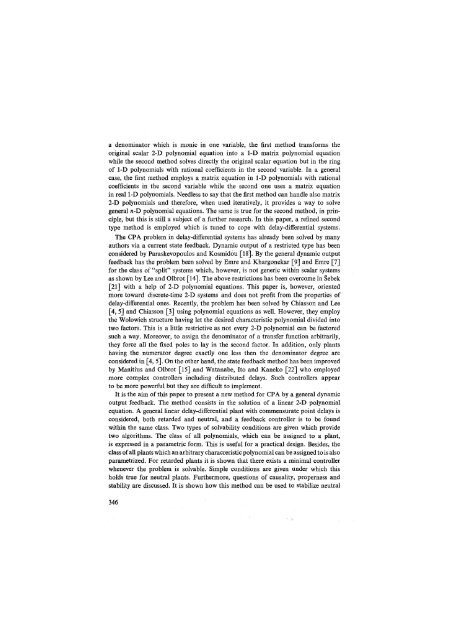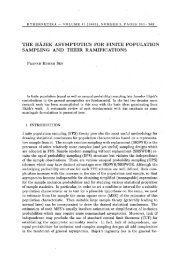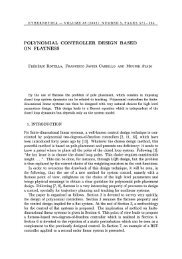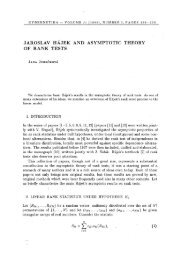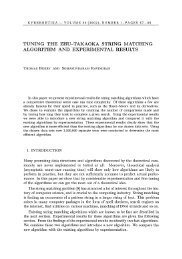characteristic polynomial assignment for delay ... - Kybernetika
characteristic polynomial assignment for delay ... - Kybernetika
characteristic polynomial assignment for delay ... - Kybernetika
You also want an ePaper? Increase the reach of your titles
YUMPU automatically turns print PDFs into web optimized ePapers that Google loves.
a denominator which is monic in one variable, the first method trans<strong>for</strong>ms the<br />
original scalar 2-D <strong>polynomial</strong> equation into a 1-D matrix <strong>polynomial</strong> equation<br />
while the second method solves directly the original scalar equation but in the ring<br />
of 1-D <strong>polynomial</strong>s with rational coefficients in the second variable. In a general<br />
case, the first method employs a matrix equation in 1-D <strong>polynomial</strong>s with rational<br />
coefficients in the second variable while the second one uses a matrix equation<br />
in real 1-D <strong>polynomial</strong>s. Needless to say that the firstmethod can handle also matrix<br />
2-D <strong>polynomial</strong>s and there<strong>for</strong>e, when used iteratively, it provides a way to solve<br />
general «-D <strong>polynomial</strong> equations. The same is true <strong>for</strong> the second method, in principle,<br />
but this is still a subject of a further research. In this paper, a refined second<br />
type method is employed which is tuned to cope with <strong>delay</strong>-differential systems.<br />
The CPA problem in <strong>delay</strong>-differential systems has already been solved by many<br />
authors via a current state feedback. Dynamic output of a restricted type has been<br />
considered by Paraskevopoulos and Kosmidou [18]. By the general dynamic output<br />
feedback has the problem been solved by Emre and Khargonekar [9] and Emre [7]<br />
<strong>for</strong> the class of "split" systems which, however, is not generic within scalar systems<br />
as shown by Lee and Olbrot [14]. The above restrictions has been overcome in Sebek<br />
[21] with a help of 2-D <strong>polynomial</strong> equations. This paper is, however, oriented<br />
more toward discrete-time 2-D systems and does not profit from the properties of<br />
<strong>delay</strong>-differential ones. Recently, the problem has been solved by Chiasson and Lee<br />
[4, 5] and Chiasson [3] using <strong>polynomial</strong> equations as well. However, they employ<br />
the Wolowich structure having let the desired <strong>characteristic</strong> <strong>polynomial</strong> divided into<br />
two factors. This is a little restrictive as not every 2-D <strong>polynomial</strong> can be factored<br />
such a way. Moreover, to assign the denominator of a transfer function arbitrarily,<br />
they <strong>for</strong>ce all the fixed poles to lay in the second factor. In addition, only plants<br />
having the numerator degree exactly one less then the denominator degree are<br />
considered in [4, 5]. On the other hand, the state feedback method has been improved<br />
by Manitius and Olbrot [15] and Watanabe, Ito and Kaneko [22] who employed<br />
more complex controllers including distributed <strong>delay</strong>s. Such controllers appear<br />
to be more powerful but they are difficult to implement.<br />
It is the aim of this paper to present a new method <strong>for</strong> CPA by a general dynamic<br />
output feedback. The method consists in the solution of a linear 2-D <strong>polynomial</strong><br />
equation. A general linear <strong>delay</strong>-differential plant with commensurate point <strong>delay</strong>s is<br />
considered, both retarded and neutral, and a feedback controller is to be found<br />
within the same class. Two types of solvability conditions are given which provide<br />
two algorithms. The class of all <strong>polynomial</strong>s, which can be assigned to a plant,<br />
is expressed in a parametric <strong>for</strong>m. This is useful <strong>for</strong> a practical design. Besides, the<br />
class of all plants which an arbitrary characreristic <strong>polynomial</strong> can be assigned to is also<br />
parametrized. For retarded plants it is shown that there exists a minimal controller<br />
whenever the problem is solvable. Simple conditions are given under which this<br />
holds true <strong>for</strong> neutral plants. Furthermore, questions of causality, properness and<br />
stability are discussed. It is shown how this method can be used to stabilize neutral<br />
346


